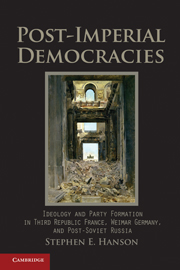 Post-Imperial Democracies
Post-Imperial Democracies Published online by Cambridge University Press: 05 June 2012
In examining the sixteen years from the formal establishment of the Russian Federation in 1992 through the election of Dmitrii Medvedev as the presidential successor to Vladimir Putin in early 2008, we obviously cannot yet rely on the sort of comprehensive, detailed historiography of the period that exists for the early French Third Republic or Weimar Germany. Fortunately, where a few historians are now just beginning to tread, a whole team of intrepid political scientists – both in Russia and the West – has over these years collectively generated a remarkably detailed account of the rise and fall of post-Soviet democracy. Indeed, our documentation of the formative years of the Russian Federation, at the levels of both elite politics and mass public opinion, is among the best that exists for any newly democratizing regime. We owe a great debt to those scholars who braved substantial professional and popular disinterest in postcommunist Russian studies, often working in challenging conditions, to obtain and analyze these data.
Despite the abundance of empirical evidence, however, how to account for Russia's political trajectory – from the collapse of the Soviet Union, through Russia's troubled experiment with representative rule in the 1990s, to its increasing authoritarianism of the early twenty-first century – remains theoretically contentious. Taken as a whole, these developments appear to have confounded the expectations of nearly all early analysts of Russian politics.
To save this book to your Kindle, first ensure no-reply@cambridge.org is added to your Approved Personal Document E-mail List under your Personal Document Settings on the Manage Your Content and Devices page of your Amazon account. Then enter the ‘name’ part of your Kindle email address below. Find out more about saving to your Kindle.
Note you can select to save to either the @free.kindle.com or @kindle.com variations. ‘@free.kindle.com’ emails are free but can only be saved to your device when it is connected to wi-fi. ‘@kindle.com’ emails can be delivered even when you are not connected to wi-fi, but note that service fees apply.
Find out more about the Kindle Personal Document Service.
To save content items to your account, please confirm that you agree to abide by our usage policies. If this is the first time you use this feature, you will be asked to authorise Cambridge Core to connect with your account. Find out more about saving content to Dropbox.
To save content items to your account, please confirm that you agree to abide by our usage policies. If this is the first time you use this feature, you will be asked to authorise Cambridge Core to connect with your account. Find out more about saving content to Google Drive.